Dear Friend,
It is my honor to represent the 38th House District at the Capitol as your state representative.
My staff and I are always here to help you with any questions you may have, and we strive to do our best to answer them or put you in touch with someone who can. If you have any other questions, comments or concerns, please feel free to call my office at (517) 373-0827 or email me at JoeyAndrews@house.mi.gov
Be sure to also check out the latest happenings on the Lakeshore and in Lansing on my social media platforms on Facebook and Twitter!
Sincerely,
Joey Andrews
State Representative
Michigan’s 38th House District
In this issue:
- District Events
- Capitol Update
- Community Update
District Events
Join me for an upcoming Community Conversation event. These monthly events offer a chance for me to update you on my work in the state House and provide a great opportunity for you to share your thoughts on the issues that matter most to you and your family.

Capitol Update
Fighting for Fair Wages
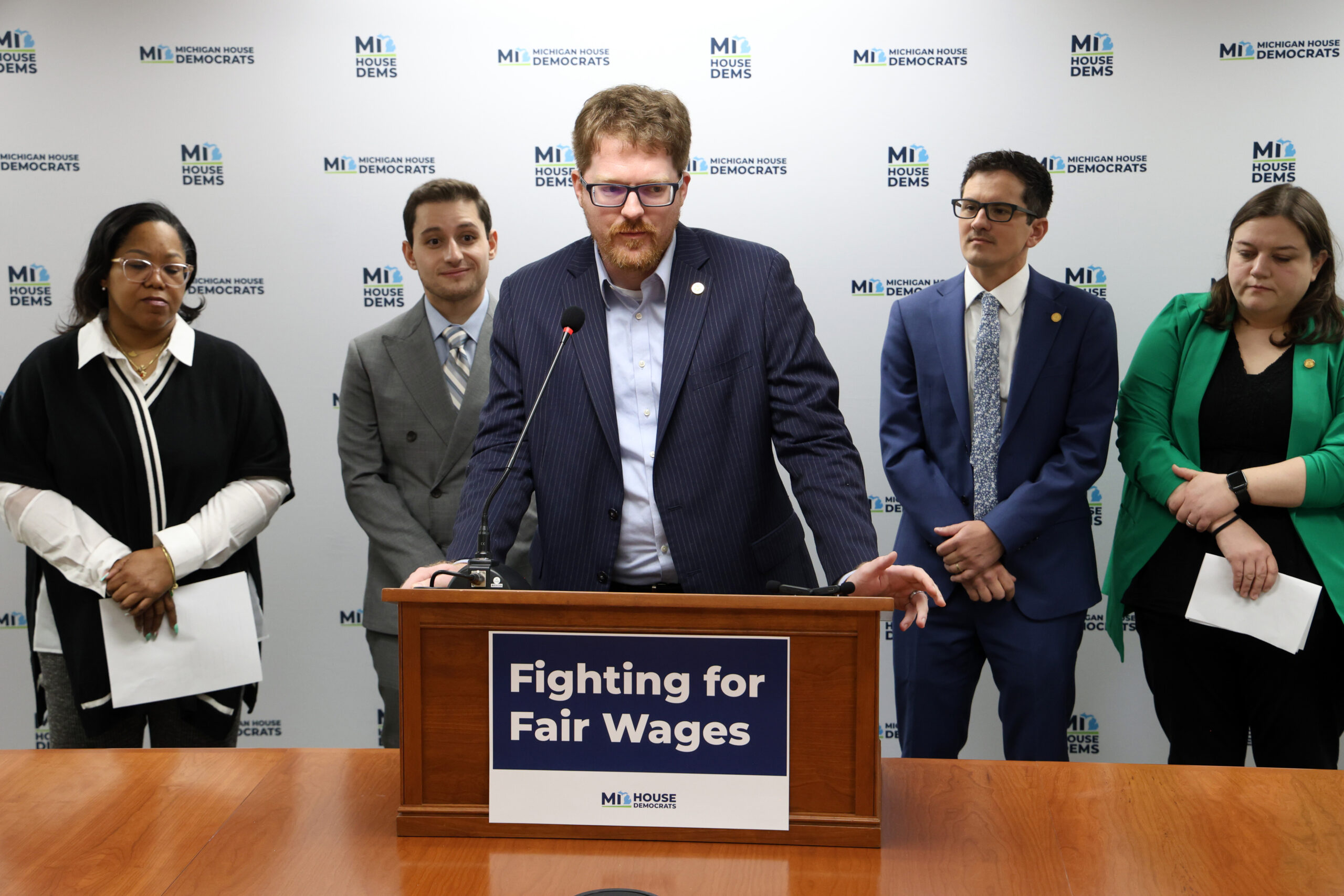
◆ On April 16, House Democrats and I introduced the Stop Payroll Fraud legislative package. House Bills 4316–27 are designed to protect wages, enforce accountability and fight for Michigan workers. The legislation targets companies that cheat workers, the state and other businesses by misclassifying employees or paying them off the books to avoid taxes. Key provisions include strengthening whistleblower protections, increasing penalties for payroll fraud, reimbursing back-wages and benefits to cheated workers, banning most non-compete agreements and requiring notice of such agreements to job applicants.
This legislation is needed because payroll fraud is estimated to cost Michigan taxpayers $107 million a year in lost tax revenue. With wages often failing to keep pace with rising inflation and prices, every worker needs to make sure their dollar goes as far as it can. In times of economic stress and supply chain disruptions, unscrupulous employers sometimes try to recapture money by cutting corners on wages. That is why it is more important than ever to ensure workers are paid fairly, their wages are protected and that they are not the first target when employers try to recoup losses.
The bills have been referred to the House Committee on Economic Competitiveness.
Appointment to Michigan Law Revision Commission
◆ On April 18, I was appointed by the Speaker of the House to serve on the Michigan Law Revision Commission. The commission examines state laws, statutes and judicial decisions to identify areas for improvement and recommend necessary reforms. I am honored to be named to serve on this commission. As an attorney and a legislator, I understand the importance of the consistent review of our state’s laws and judicial decisions to ensure they are working for the people of Michigan. It is the greatest honor and responsibility of my life to ensure our laws reflect the needs of Michigan’s communities. I welcome the opportunity to continue to serve the people of Michigan in this capacity, and I look forward to all we will accomplish.
Protecting Michigan Workers
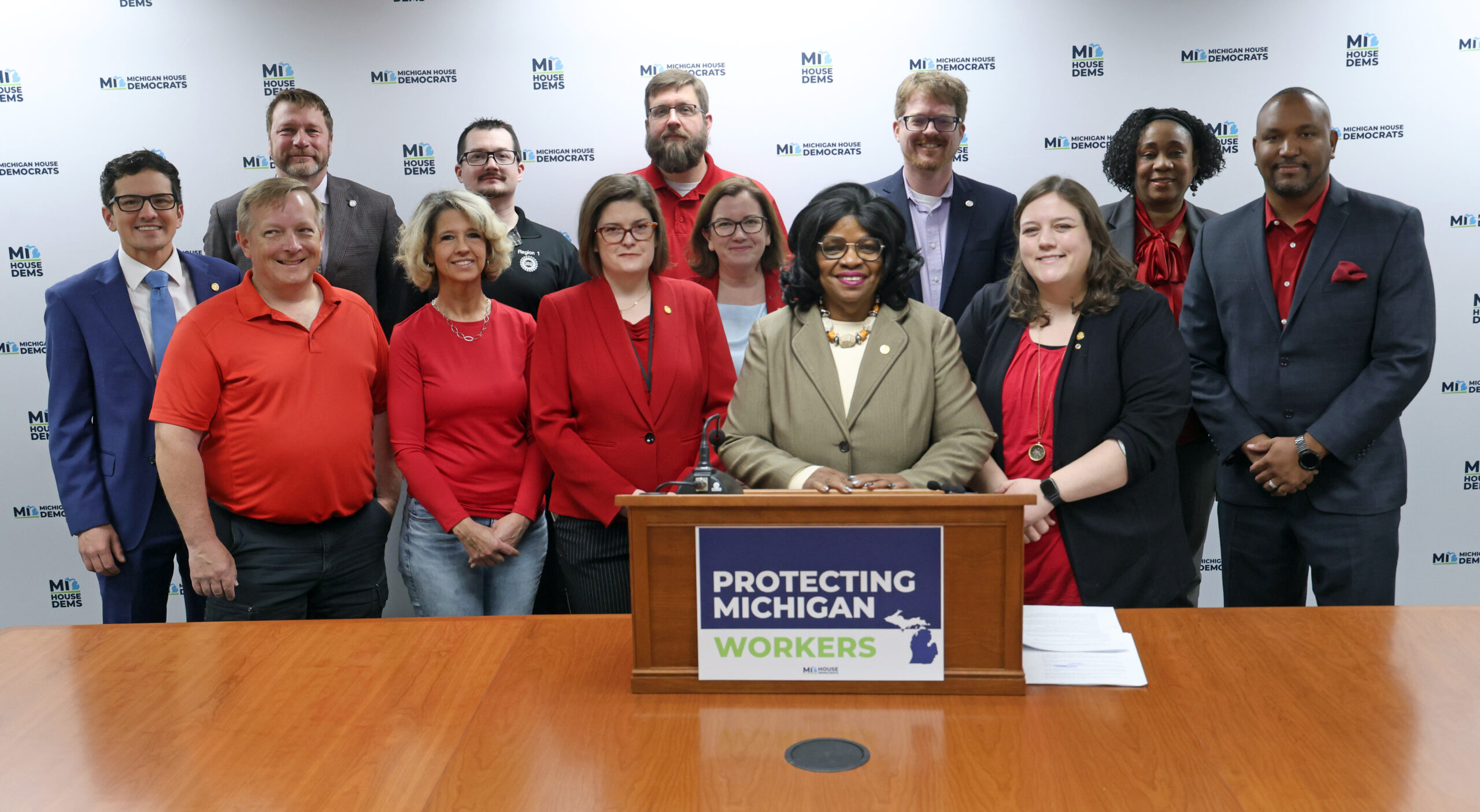
◆ On May 1, International Workers Day, House Democrats and I introduced the Putting Workers First legislative package, a set of bills that restore balance, fairness and respect in the workplace for Michigan workers while returning local control to our communities. These bills strengthen protections for Michigan’s workers and ensure safe, fair and dignified workplaces across the state. They are part of a broader effort to safeguard workers’ rights, promote collective bargaining and hold employers accountable to higher standards.
Key provisions include protections against retaliation for employees who report safety hazards, raise health concerns or engage in union activity. The legislation would also align Michigan’s workplace safety penalties with federal OSHA standards and establish protections for workers who refuse unsafe assignments. Another bill would require employers to have “just cause” before terminating employees after a probationary period, modeled after a Montana law.
The package expands collective bargaining rights by preventing employers from shutting down operations to avoid unionization and promotes fair union elections in the public sector. It also bans exploitative practices such as the use of replacement workers during strikes, taxpayer-funded union-busting in health care and discrimination based on off-duty conduct, appearance or family health status.
Finally, my bill repeals PA 98 of 2011, which banned Project Labor Agreements (PLAs) on public construction projects. PLAs are agreements that ensure fair wages, safe worksites and local hiring standards. Repealing this law restores local control, empowering communities to negotiate PLAs that protect workers and strengthen labor standards.
Too often, border communities like mine have seen out-of-state contractors undercut Michigan workers by skirting our laws and paying substandard wages. This bill will help change that by strengthening protections for our workforce and ensuring that Michigan jobs go to Michigan workers who deserve fair wages and dignity on the job.
The legislation was referred to the House Committee on Economic Competitiveness.
Michigan Natural Resources Trust Fund
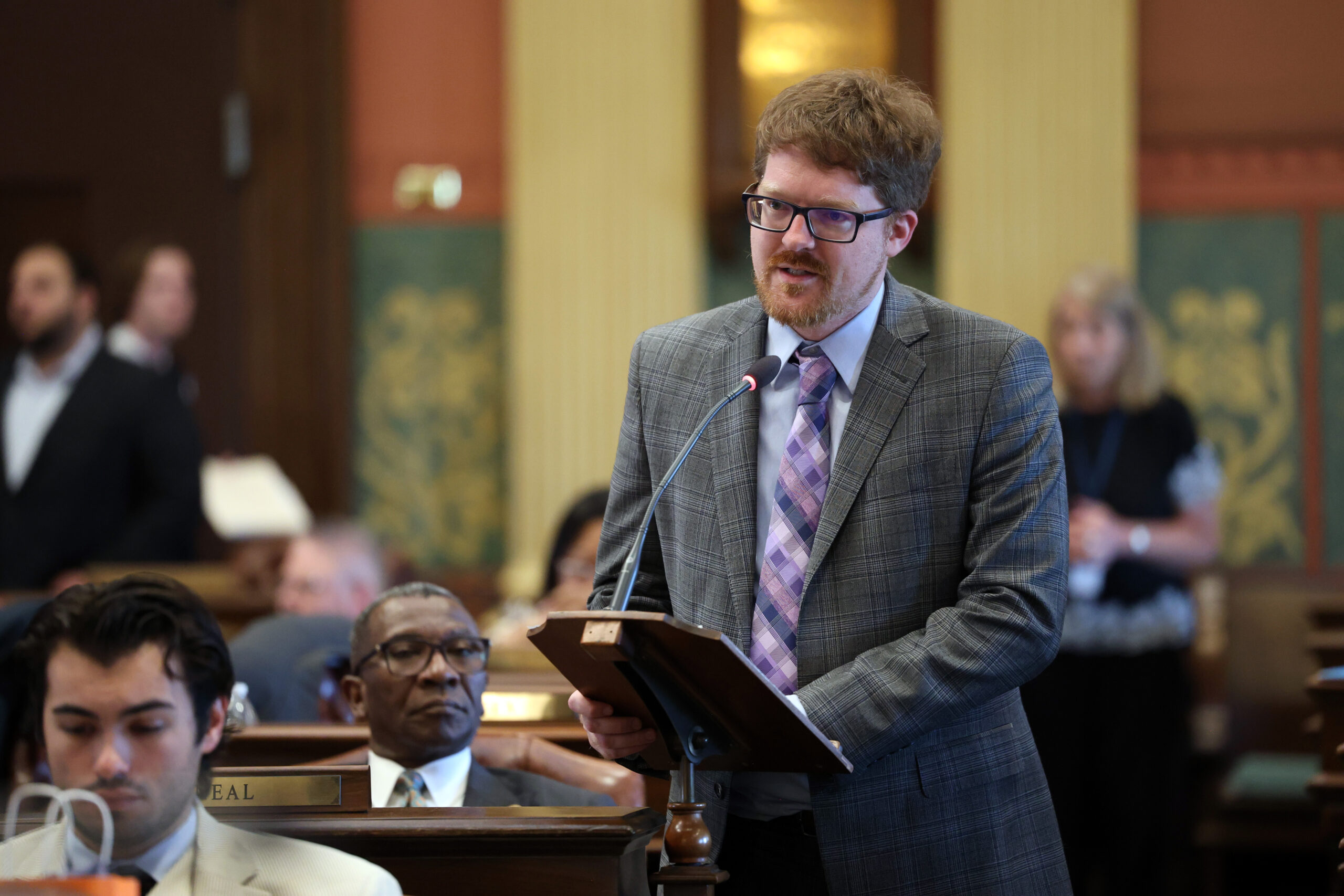
◆ On May 14, I spoke on the House floor in favor of House Bill 4392, an appropriations bill that allocates critical funding through the Michigan Natural Resources Trust Fund for projects that enhance our environment and expand public recreation opportunities. I was proud to help secure $650,000 for our community, including $300,000 for Marquette Greenway development and $350,000 for improvements to Lincoln Township Beach. These investments will make our public spaces more accessible and welcoming for families, children and seniors. They also strengthen neighborhoods, promote public health and help preserve our natural resources for future generations.
Anaerobic Digester Legislation Clears Committee
◆ On May 15, I testified before the House Agriculture Committee in support of my bipartisan methane digester legislation, introduced on March 18 with state Rep. Jerry Neyer (R-Shepherd). House Bills 4265 and 4257 aim to support clean energy and sustainable agriculture while strengthening local economies by streamlining the permitting process for methane digesters, which convert organic waste into renewable natural gas and nutrient-rich fertilizer.
On June 5, the committee reported the legislation out with a recommendation for consideration on the House floor. The current regulatory framework has created roadblocks, and these bills address that challenge by providing farmers with a clear path forward and much-needed clarity for digesters that play a critical role in Michigan’s food production system.
Historic Preservation Tax Credit
◆ On May 20, state Rep. Steve Frisbie (R-Battle Creek) and I introduced House Bills 4503 and 4504 to expand the statewide cap on the Historical Preservation Tax Credit to $100 million. The Historic Preservation Tax Credit is a proven economic development tool that drives private investment into the rehabilitation of historic buildings, supports skilled trades jobs, revitalizes communities and preserves Michigan’s cultural heritage. However, the current $5 million annual cap has severely limited the program’s potential.
When the credit opened in 2022, overwhelming demand made it clear that the existing cap is far too low. Within just five hours, income-producing project applications represented $368 million in qualified expenditures translating into $92 million in credit requests.
This legislation would raise the cap to better match the real scope of interest and investment readiness. It would also help create certainty for applicants, many of whom are currently stuck in a queue with no clear timeline or assurance that their projects will receive support. By adjusting the cap to reflect actual project sizes and interest, we can better level the playing field and make the program work as intended.
The legislation was referred to the House Committee on Economic Competitiveness.
Ceremonial Bill Signing
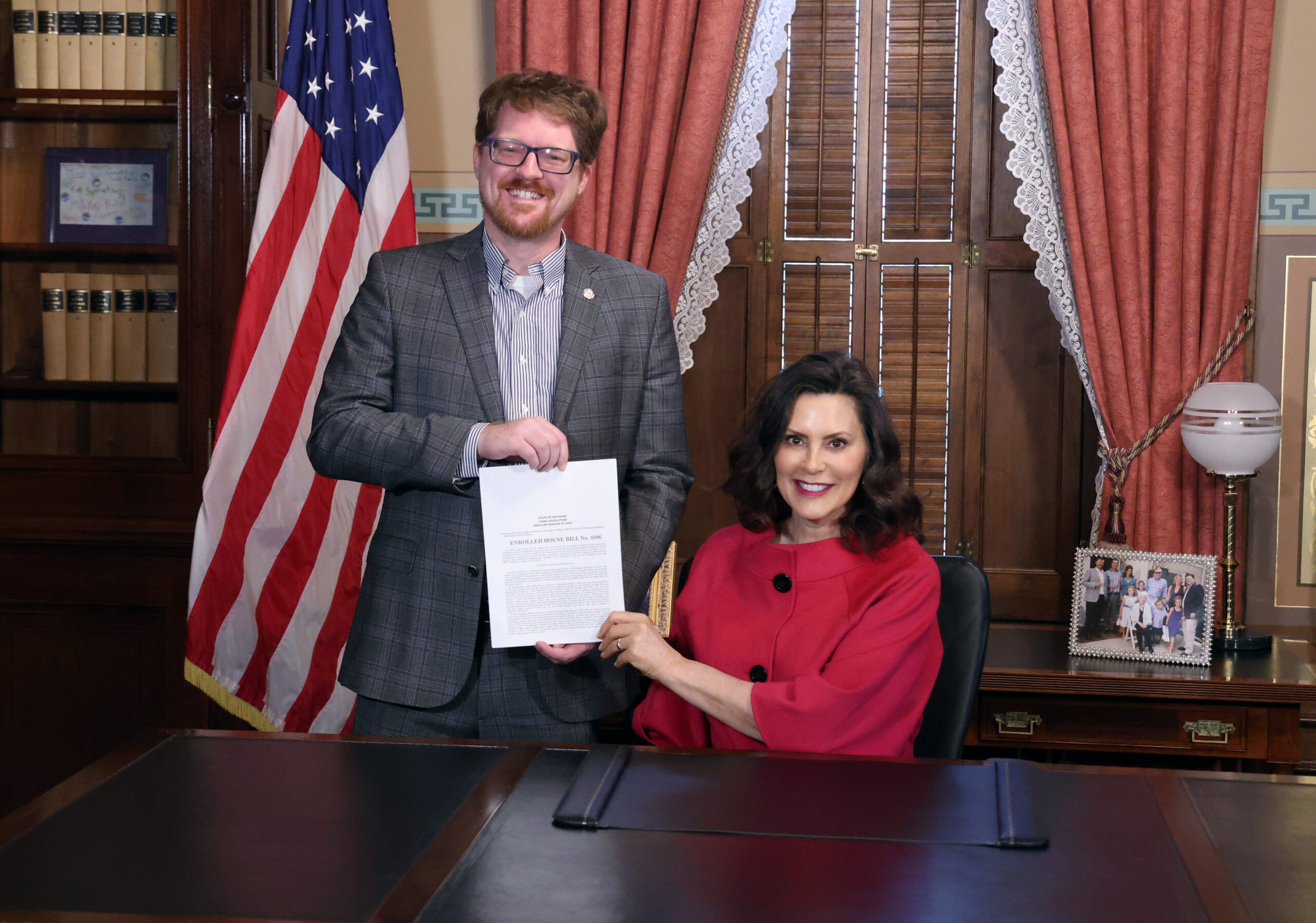
◆ On May 22, I joined the Governor for the ceremonial signing of my bill, House Bill 4906, now Public Act 207 of 2024. This legislation, officially signed earlier in January, supports job growth and local economies by providing incentives for data centers to locate in Michigan. The bill also supports Michigan business owners and helps to expand data center production in Michigan by extending a tax exemption for individuals and companies investing in data center equipment. The jobs created and increased tax revenue could provide Michigan communities with tens of millions of dollars for schools and operating costs.
House Bill 4385
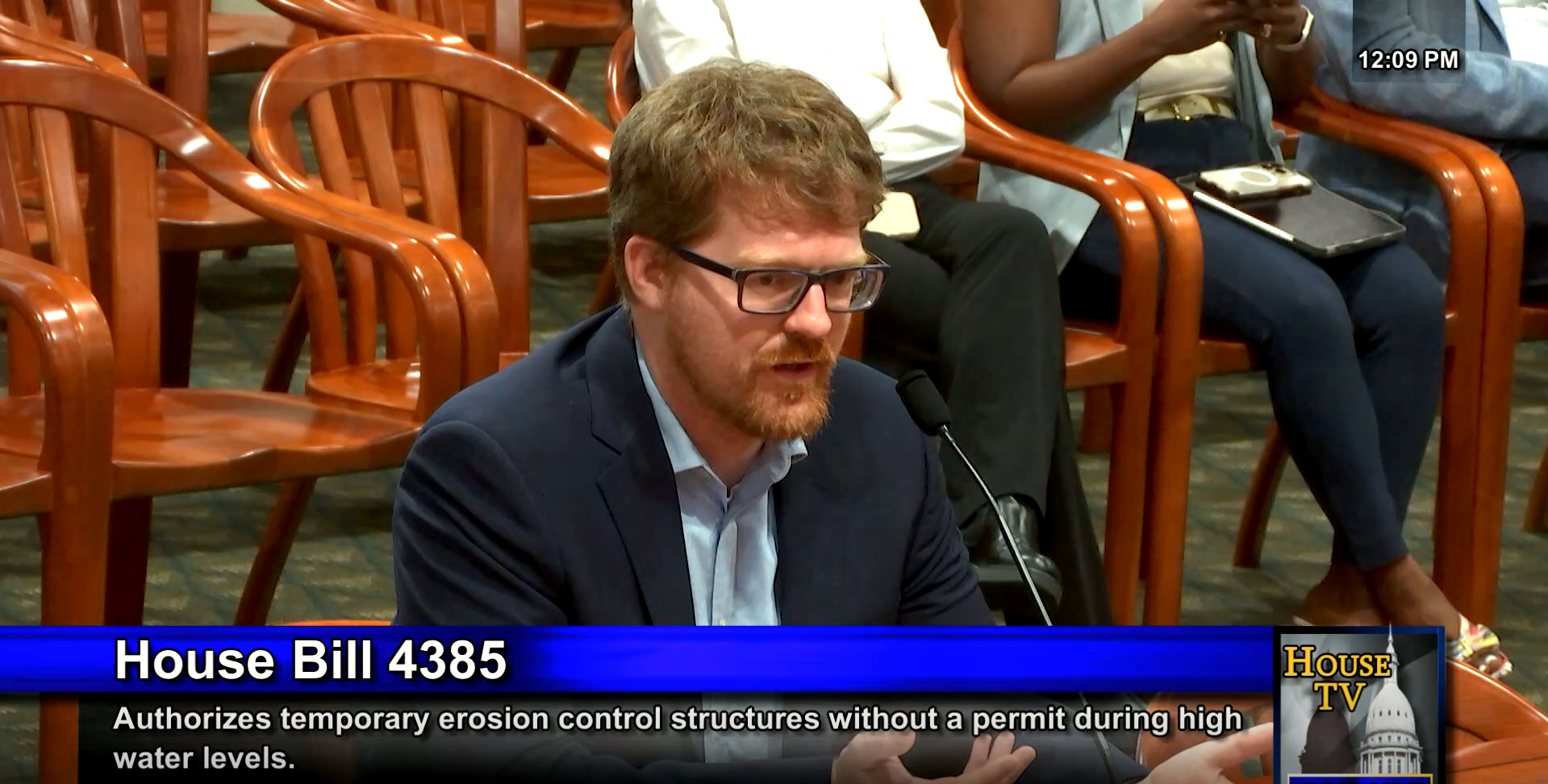
◆ On June 4, I testified before the House Natural Resources and Tourism Committee in support of House Bill 4385, which I introduced on April 23. The bill would provide an exemption to EGLE’s existing shoreline permit requirements for certain types of erosion control structures during high water events, specifically focusing on soft structures like sandbags that can shore up a lakefront property without creating significant environmental damage or obstructing public waterways.
The exemption would only apply to waterfront property owners on the Great Lakes or Lake St. Clair and would require any erosion control structures to be made from BPA-free and biodegradable materials.
My district includes 100 miles of Lake Michigan shoreline. Michigan currently lacks a comprehensive shoreline stabilization strategy, leaving property owners with limited and often costly options to protect their land. Historically high water levels in Lake Michigan in 2020 caused much of the lakefront in my district to require sandbag structures to keep dunes and the homes that sit atop them from sliding into the lake. EGLE issued temporary emergency permits for these sandbags to avoid further armoring of the beach line until the water levels receded. Now that water levels have receded, EGLE is requiring property owners to remove the sandbags, but enforcement is inconsistent and removal can be costly, ecologically disruptive and destabilizing. Many of the sandbags have become buried by sand and vegetation, contributing to natural dune stabilization.
In many cases, the sandbags are still serving a purpose, holding dunes in place, keeping homes secure and helping vegetation return. These soft sandbags are becoming part of the landscape and offer a more natural, less disruptive way to stabilize the shoreline. Unlike harder erosion control structures, they can preserve the walkable area between a beachfront property and the water line itself.
Water levels in the Great Lakes are cyclical and projected to rise again, so removing sandbags now could leave shorelines and homes vulnerable in future high water events. During high water events, homeowners along the lakeshore don’t have time to go through the EGLE permitting process — which can take weeks or months — to protect their properties from coastal erosion.
This legislation offers a balanced, adaptive approach to shoreline management. It recognizes that emergency interventions like sandbags can evolve into long-term stabilizing features. By allowing sandbags to remain where they have contributed to ecosystem recovery, we can reduce future erosion risks and minimize the need for more invasive shoreline hardening.
Community Update
MEDC Awards Trusted Connector & Entrepreneur Support Grants
◆ On May 21, the Michigan Economic Development Corporation awarded the Southwest Michigan Regional Chamber a $250,000 Trusted Connector Grant to support and expand its Chamber Growth Alliance (CGA) model within Berrien County.
SMRC will hire three new CGA Directors to deliver on-the-ground business development services in these currently underserved communities, including the HUBZones of census tract 213 (Berrien Springs) and the Pokagon Reservation. By embedding dedicated CGA Directors within these communities, SMRC will create a stronger, more inclusive economic ecosystem that empowers businesses, attracts investment and lays the groundwork for lasting prosperity.

